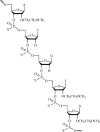The role of stress proteins in prostate cancer
- PMID: 18645594
- PMCID: PMC2430682
- DOI: 10.2174/138920207781386951
The role of stress proteins in prostate cancer
Abstract
The development of therapeutic resistance, after hormone or chemotherapy for example, is the underlying basis for most cancer deaths. Exposure to anticancer therapies induces expression of many stress related proteins, including small heat shock proteins (HSPs). HSPs interact with various client proteins to assist in their folding and enhance the cellular recovery from stress, thus restoring protein homeostasis and promoting cell survival. The vents of cell stress and cell death are linked, as the induction of molecular chaperones appears to function at key regulatory points in the control of apoptosis. On the basis of these observations and on the role of molecular chaperones in the regulation of steroid receptors, kinases, caspases, and other protein remodelling events involved in chromosome replication and changes in cell structure, it is not surprising that molecular chaperones have been implicated in the control of cell growth and in resistance to various anticancer treatments that induce apoptosis. Recently, several molecular chaperones such as Clusterin and HSP27 have been reported to be involved in development and progression of hormone-refractory prostate cancer. In this review, we address some of the molecular and cellular events initiated by treatment induced stress, and discuss the potential role of chaperone proteins as targets for prostate cancer treatment.
Keywords: Clusterin; OGX-011; Prostate cancer; antisense oligonucleotide; apoptosis; chemotherapy; heat shock protein.
Figures



References
-
- Jemal A, Siegel R, Ward E, Murray T, Xu J, Smigal C, Thun MJ. Cancer statistics. CA Cancer J Clin. 2006;56(2):106–130. - PubMed
-
- McGarvey TW, Meng RD, Johnson O, El-Deiry W, Malkowicz SB. Growth inhibitory effect of p21 and p53 containing adenoviruses on transitional cell carcinoma cell lines in vitro and in vivo. Urol Oncol. 2001;6(4):155–162. - PubMed
-
- Tannock IF, de Wit R, Berry WR, Horti J, Pluzanska A, Chi KN, Oudard S, Theodore C, James ND, Turesson I, Rosenthal MA, Eisenberger MA. Docetaxel plus prednisone or mitoxantrone plus prednisone for advanced prostate cancer. N Engl J Med. 2004;351(15):1502–1512. - PubMed
-
- Tannock IF, Osoba D, Stockler MR, Ernst DS, Neville AJ, Moore MJ, Armitage GR, Wilson JJ, Venner PM, Coppin CM, Murphy KC. Chemotherapy with mitoxantrone plus prednisone or prednisone alone for symptomatic hormone-resistant prostate cancer: a Canadian randomized trial with palliative end points. J Clin Oncol. 1996;14(6):1756–1764. - PubMed
-
- Scher HI, Eisenberger M, D’Amico AV, Halabi S, Small EJ, Morris M, Kattan MW, Roach M, Kantoff P, Pienta KJ, Carducci MA, Agus D, Slovin SF, Heller G, Kelly WK, Lange PH, Petrylak D, Berg W, Higano C, Wilding G, Moul JW, Partin AN, Logothetis C, Soule HR. Eligibility and outcomes reporting guidelines for clinical trials for patients in the state of a rising prostate-specific antigen: recommendations from the Prostate-Specific Antigen Working Group. J Clin Oncol. 2004;22(3):537–556. - PubMed
LinkOut - more resources
Full Text Sources
Research Materials
Miscellaneous
